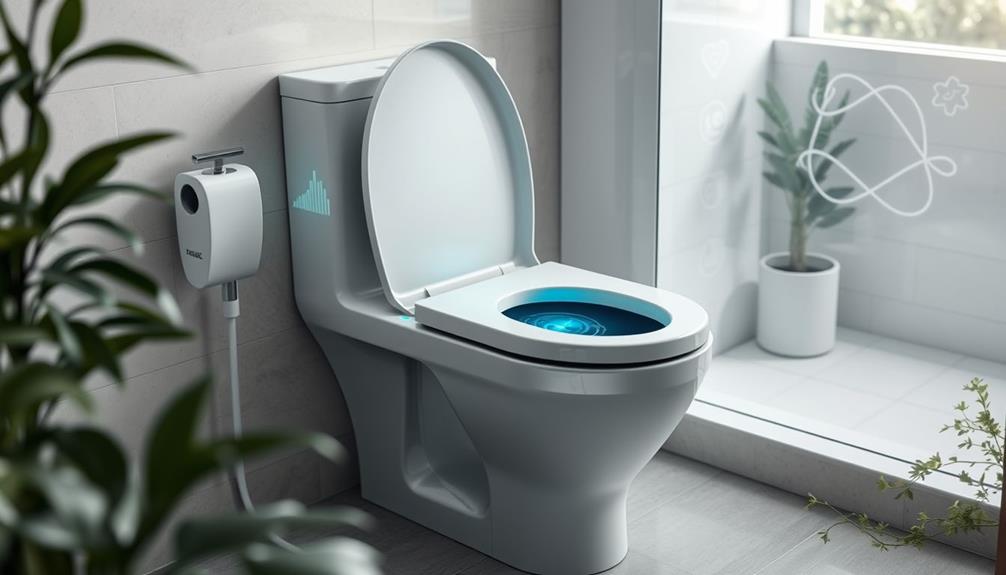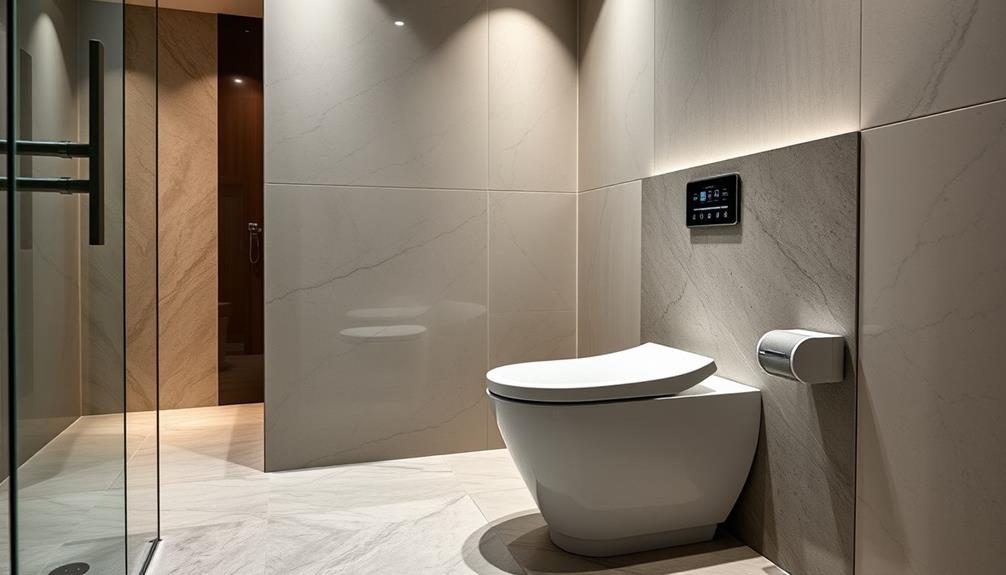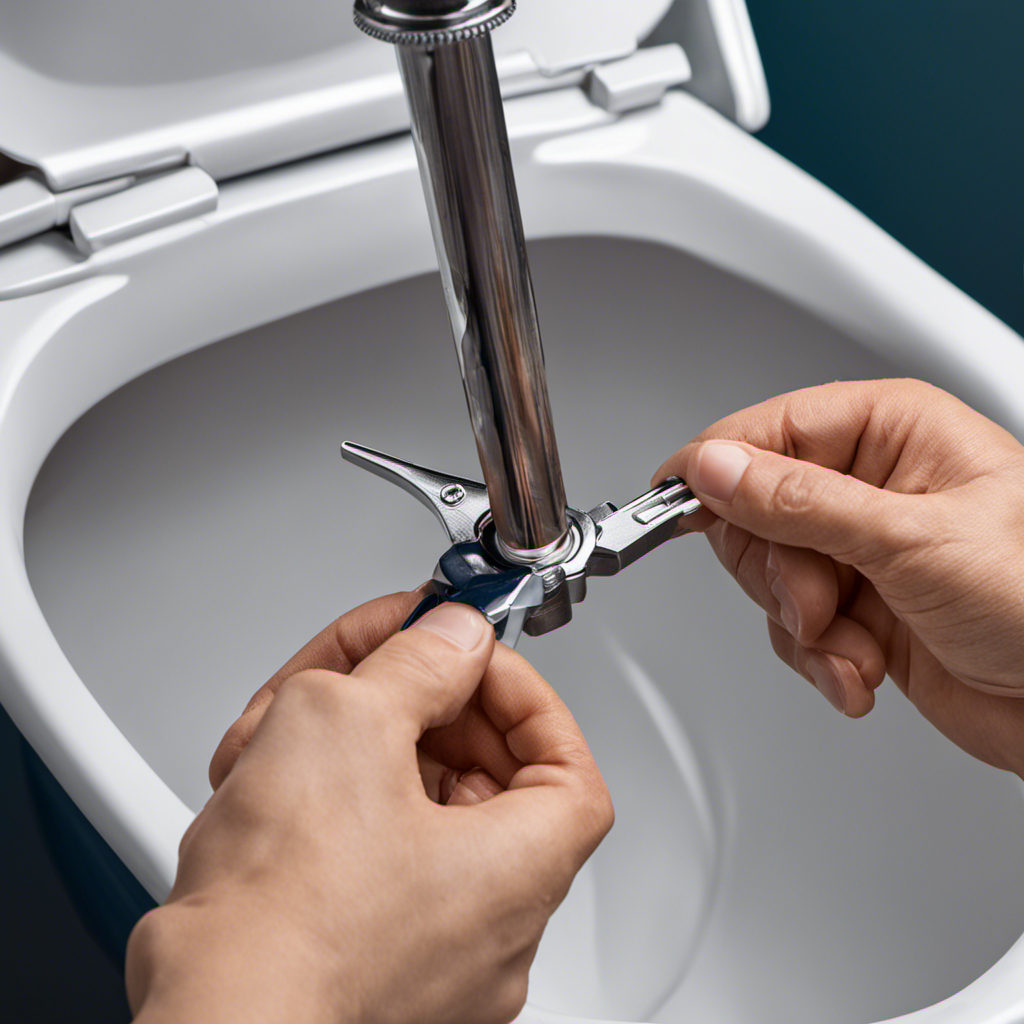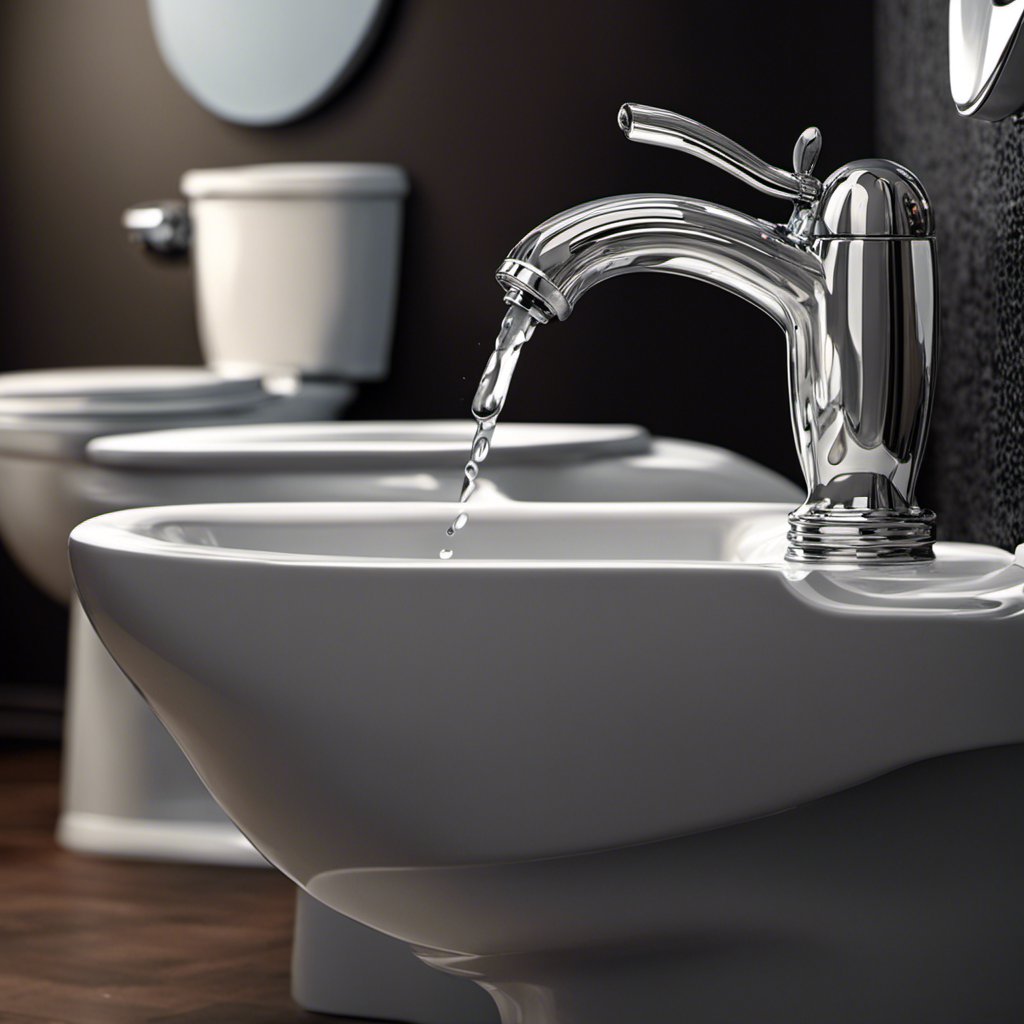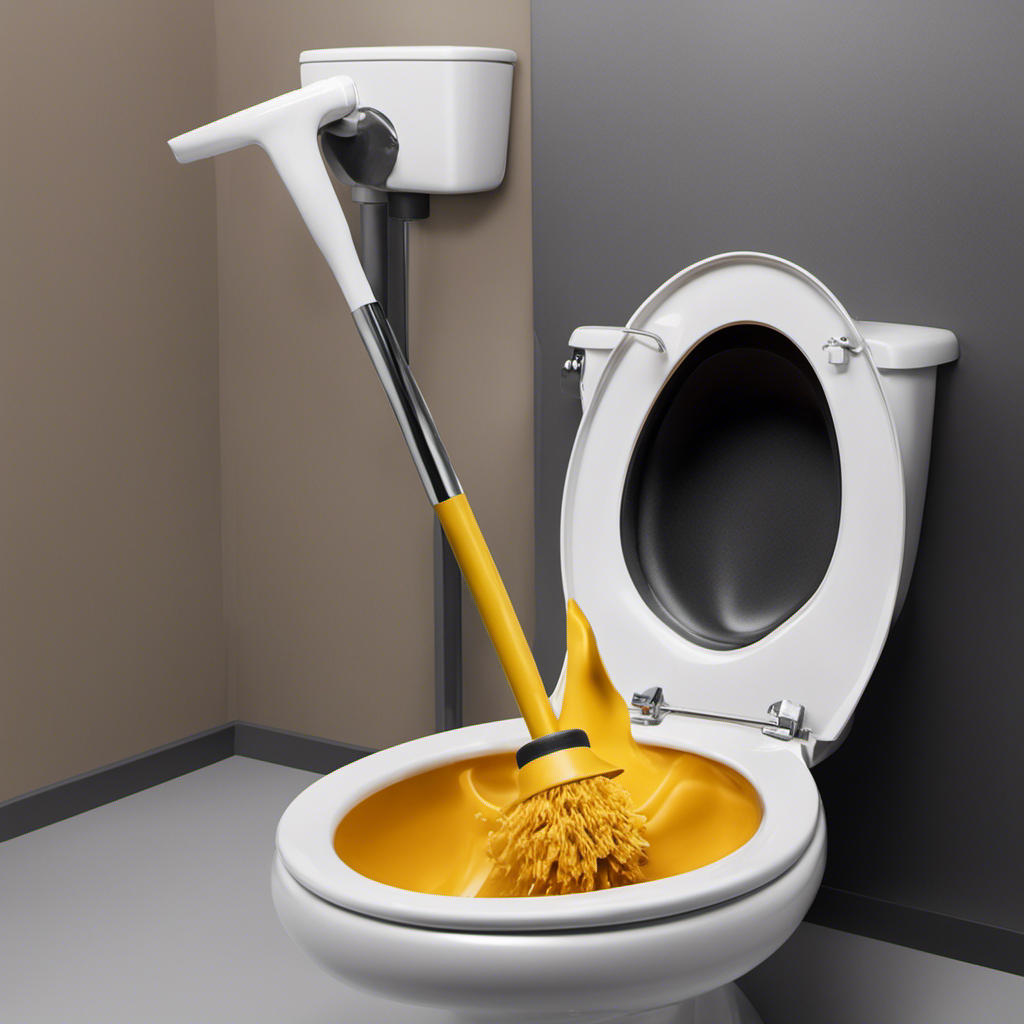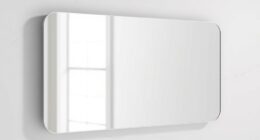Smart toilets can alert you to early signs of health issues by analyzing your waste for key biomarkers and crucial indicators. They monitor urine color, flow rate, and stool consistency, providing real-time insights into your health. With advanced sensors, these toilets can identify potential problems like diabetes or kidney issues before they escalate. The non-invasive nature of this technology allows for continuous health monitoring, making it easy to track changes over time. By understanding your health trends, you'll be empowered to take proactive steps. Curious about how these innovations work? There's much more to explore!
Key Takeaways
- Smart toilets analyze urine and stool, identifying biomarkers that signal early signs of diseases like diabetes and kidney issues.
- Continuous monitoring of urine color, flow rate, and fecal consistency enables timely detection of health changes.
- Non-invasive assessments through smart toilets eliminate the need for invasive testing, making health monitoring more accessible.
- Real-time insights prompt users to seek medical consultations sooner, enhancing the likelihood of early disease intervention.
- Data trends collected over time facilitate proactive healthcare measures, improving overall health outcomes in communities.
Smart Toilet Technology Overview
Smart toilet technology is revolutionizing how we monitor our health in everyday life. These innovative devices use advanced sensors to analyze your urine and stool, providing real-time insights into your health. By detecting various health indicators and biomarkers during routine use, smart toilets enable you to stay informed about your well-being effortlessly.
Additionally, toilet maintenance practices can enhance the longevity and performance of these smart devices, ensuring they function effectively.
Equipped with artificial intelligence algorithms, smart toilets interpret your biological data and offer personalized insights through connected mobile apps. They monitor essential health metrics like urine color, flow rate, and fecal consistency, helping identify early signs of conditions such as diabetes, kidney disease, and certain cancers. This capability allows for timely disease detection, giving you a proactive approach to health management.
Smart toilets securely transmit the collected biological data to the cloud, facilitating continuous monitoring without requiring any additional effort from you. Their seamless integration into existing toilet fixtures makes health monitoring accessible and non-invasive for everyone in your household.
With this technology, you can take charge of your health like never before, ensuring that you're aware of potential issues before they escalate. Embrace the future of health monitoring with smart toilets, and stay ahead of your health journey.
Health Monitoring Capabilities
With smart toilets, you can easily monitor your health from the comfort of your home, detecting potential diseases like diabetes or kidney issues early on.
These devices provide continuous health insights, allowing you to track changes over time. Incorporating regular physical activity can further enhance these health monitoring capabilities, as it plays an essential role in overall well-being and menopause management.
However, it's important to reflect on how your health data is protected as you embrace this technology.
Disease Detection Capabilities
The emergence of innovative toilet technology brings a new dimension to health monitoring, allowing early disease detection right from your bathroom. Smart toilets utilize advanced sensors to analyze urine and stool samples, identifying potential health issues such as diabetes, kidney disease, and various cancers through specific biomarkers found in waste. This real-time data can alert you to abnormal health trends that might otherwise go unnoticed.
Additionally, mental health support is essential for cognitive health maintenance, as physical health can impact emotional well-being.
By monitoring important indicators like urine color, fecal morphology, flow rate, and volume, smart toilets provide insights into your health that facilitate chronic disease management. If any concerning results arise, these systems can send alerts to your healthcare providers, ensuring timely interventions when necessary.
Research indicates that consistent monitoring can help detect signs of illness over time, enabling early intervention and potentially reducing healthcare costs through preventive care strategies.
Additionally, the integration of optical scanning technology enhances the precision of waste analysis, allowing for detailed assessments of metabolic changes and hydration levels. With smart toilets, you can take charge of your health in a way that's both convenient and informative.
Continuous Health Monitoring
As you go about your daily routine, continuous health monitoring through advanced toilet technology offers a seamless way to stay informed about your well-being.
Smart toilets equipped with cutting-edge sensors provide real-time monitoring by analyzing your urine and feces. This enables them to detect vital health indicators such as hydration levels and the presence of disease biomarkers.
Hydration is vital for overall health, and these smart toilets can help guarantee you maintain adequate fluid intake.
With the ability to measure multiple biomarkers simultaneously, these toilets allow for thorough health assessments during your normal toileting habits, eliminating the need for invasive testing.
This continuous health monitoring can identify early signs of serious conditions like cancers, diabetes, and kidney issues, enabling timely alerts for any abnormal health conditions.
Data Privacy Considerations
Data privacy is an essential factor when it comes to smart toilets and their health monitoring capabilities. As these devices gather health data through advanced sensors, guaranteeing privacy is critical. Smart toilets can detect early signs of health issues like diabetes or kidney disease, but this data must be securely handled to maintain your trust.
The increasing focus on cybersecurity and system vulnerabilities emphasizes the need for robust security measures in health monitoring technologies.
To protect your information, smart toilets employ user identification features, such as fingerprint scanning and facial recognition. This guarantees that your health data is personalized and securely stored. Compliance with privacy regulations, like HIPAA, is fundamental to safeguard against unauthorized access and misuse of sensitive information.
Moreover, the integration of consent frameworks is necessary. You should be fully informed about how your data will be used, stored, and shared, which fosters trust and encourages participation in health monitoring initiatives.
Real-time monitoring provides individualized health insights, but it's crucial that you feel confident in the data security measures in place. By prioritizing these considerations, smart toilets can offer valuable health insights while protecting your privacy.
Early Detection of Diseases
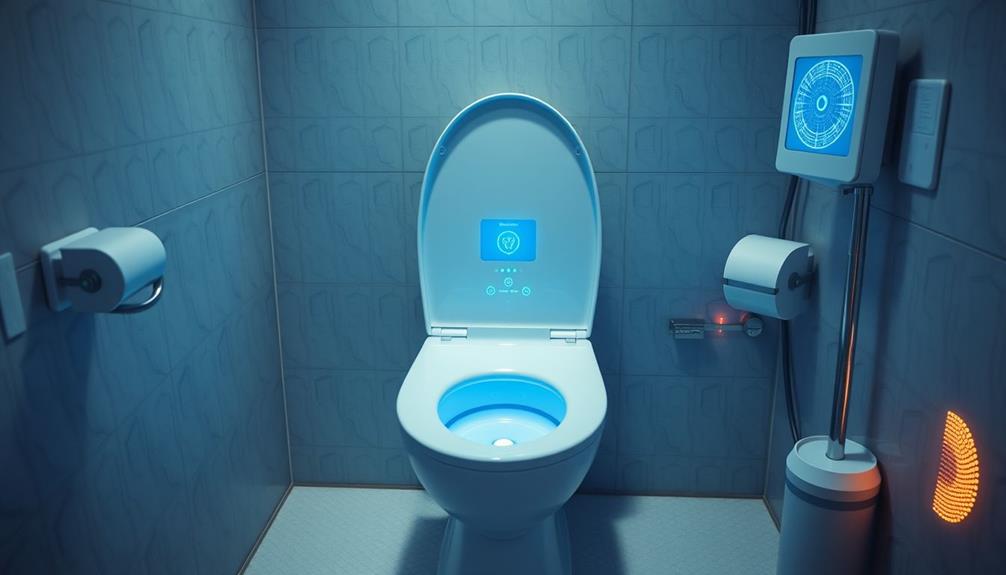
Smart toilets offer a groundbreaking way to analyze biomarkers in your urine and stool, helping catch early signs of diseases like diabetes and cancer.
These innovations can complement traditional screening methods, like mammography guidelines, by providing continuous health monitoring.
By continuously monitoring your health, these advanced systems provide personalized insights that can lead to timely medical interventions.
With this non-invasive technology, staying on top of your health has never been easier.
Biomarker Analysis Capabilities
The rise of innovative health technologies has transformed how we monitor our well-being, with smart toilets leading the charge in biomarker analysis. These advanced devices utilize sensors to conduct urine analysis, examining biomarkers that can reveal early signs of diseases like diabetes, kidney failure, and various cancers.
Notably, much like how cats exhibit signs of attachment to their owners, smart toilets can form a connection with users by continuously tracking their health data. By monitoring health indicators such as hydration levels and metabolic changes, smart toilets offer a thorough approach to health monitoring.
Through real-time analysis of waste samples, these toilets can identify essential health issues, facilitating timely disease detection. For example, they can screen for urological and colorectal cancers by detecting specific biomarkers that indicate illness. This capability is vital because catching diseases early can greatly improve treatment outcomes.
The integration of optical scanning technology further enhances the smart toilet's ability to perform continuous monitoring, alerting you to any abnormal health conditions. By providing insights into your body's health through minute changes in urine and stool, smart toilets empower you to stay proactive about your health.
With this level of monitoring, you can take charge of your well-being and seek medical consultations when necessary, ensuring that you stay ahead of potential health issues.
Continuous Health Monitoring
With the ability to analyze biomarkers in waste, smart toilets take health monitoring a step further by providing continuous surveillance of your well-being. These innovative devices utilize advanced sensors for urine analysis and stool analysis, enabling real-time disease detection. They can identify early signs of health issues, including diabetes, infections, and various cancers, by closely monitoring changes in urine color, consistency, and flow rate.
Additionally, understanding the importance of maintaining a healthy weight, similar to how dog owners must monitor their pets' diets, can play a vital role in overall health management dog nutrition insights.
By integrating continuous health monitoring into your daily routine, smart toilets offer a non-invasive approach to tracking important health metrics. This passive monitoring requires no effort on your part, allowing you to stay informed about hydration levels and gastrointestinal health without disrupting your life.
Research shows that smart toilets can analyze up to ten different biomarkers, making them a powerful tool for early disease detection and chronic disease management.
The potential of smart toilets to revolutionize personal health management lies in their ability to provide longitudinal health insights. With continuous data collection, they facilitate proactive interventions, helping you address potential health issues before they become severe.
Embracing this technology means taking a significant step toward better health awareness and management.
Personalized Health Insights
Imagine having a personal health assistant that discreetly monitors your well-being every time you use the bathroom. Smart toilets offer just that, utilizing advanced sensors for health monitoring through urine analysis. They provide personalized health insights by detecting specific biomarkers in your waste, revealing early signs of disease, including cancers like colorectal and urological cancer.
Additionally, just as Gold IRAs provide a hedge against inflation and economic uncertainty, smart toilets can serve as a proactive measure for your health, allowing you to stay ahead of potential issues.
With continuous monitoring, these toilets analyze changes in urine color, consistency, and volume, alerting you to potential health issues. This real-time insight can encourage timely medical consultations, making a significant difference in your health outcomes.
Plus, the integration of cloud-based technology guarantees your data is stored securely and analyzed effectively, all while respecting your privacy.
The non-invasive nature of smart toilets allows for effortless health tracking, enabling you to understand your health trends over time. With this information, you can take proactive steps toward personalized health management, addressing any abnormalities before they escalate.
Data Privacy and Security
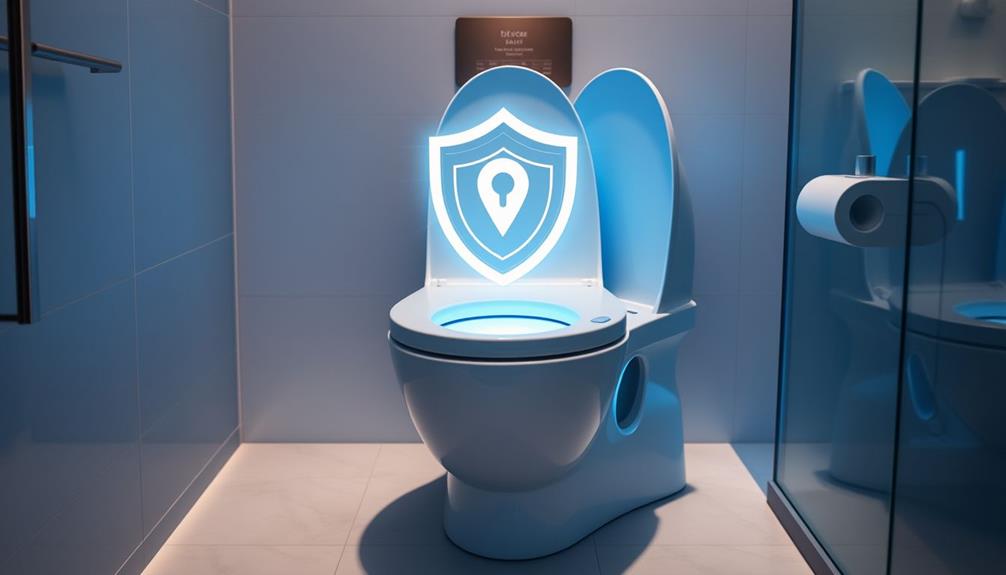
Steering through the world of smart toilets means being mindful of data privacy and security. These innovative devices collect sensitive health information, making it essential to understand how your data is protected, especially in a landscape where credit card debt in the U.S. continues to rise and data breaches are prevalent.
Here are four key aspects to take into account:
- Encryption: Smart toilets use advanced encryption methods to securely upload your health data to cloud servers, preventing unauthorized access.
- Anonymized Data: Before transmission, your data is anonymized and deidentified, ensuring compliance with standards like HIPAA and the EU's General Data Privacy Rule.
- Informed Consent: Clear communication about data storage practices and potential sharing is vital. You should always be aware of how your data is handled.
- Biometric Identifiers: Features like fingerprint and anal print recognition enhance user identification while implementing strict privacy measures to safeguard your health data.
As technology advances, staying informed about data privacy frameworks becomes even more important. The risk of reidentification of anonymized data could impact your privacy.
User Identification Features
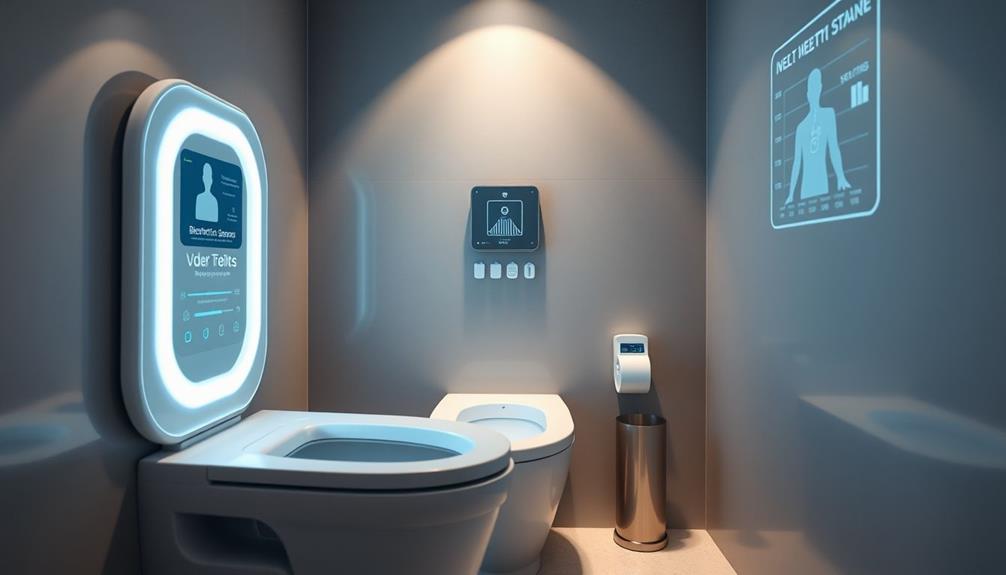
User identification features in smart toilets play an essential role in delivering personalized health insights. By employing advanced user identification methods like fingerprint recognition on the flush lever and an innovative anal print scanner, smart toilets guarantee that health monitoring is tailored to you. These unique identifiers enhance security and provide accurate feedback based on your individual data.
Smart toilets can also utilize facial recognition or user profiles, allowing them to adjust health insights according to your health history. This means that the data collected is more relevant and beneficial for your specific needs. Your health information is securely encrypted and uploaded to cloud servers, assuring that your personalized health information remains private and accessible only to you and authorized healthcare providers.
To further protect your sensitive data, smart toilets comply with HIPAA regulations, which safeguard your health information. Additionally, efforts to anonymize health data before transmission reinforce data privacy, giving you peace of mind.
With these sophisticated user identification features, smart toilets not only enhance convenience but also revolutionize the way you monitor your health, making it more personalized and secure.
Ethical Considerations
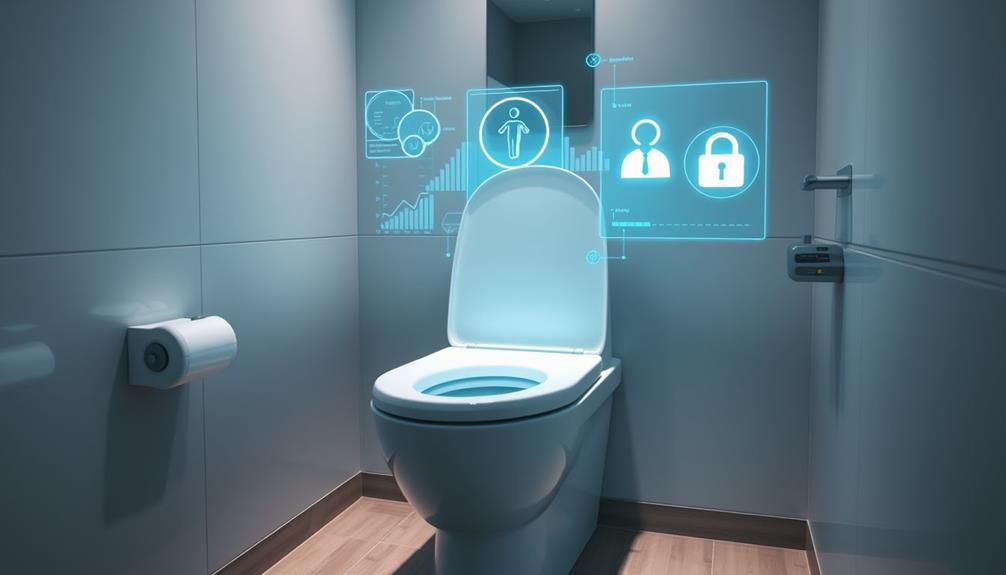
As smart toilets become more integrated into daily life, ethical concerns surrounding user privacy and data handling are increasingly in focus. You need to reflect on several key ethical challenges in collecting and managing sensitive health data:
- User Privacy: Safeguarding your information is paramount, especially when dealing with personal waste data.
- Informed Consent: It's vital that you're adequately informed about how your data will be stored, shared, and utilized, particularly for incidental findings.
- Cultural Taboos: Discussions about toileting habits can be sensitive, which may hinder acceptance. Effective communication strategies are essential to address these issues.
- Health Inequities: Access to technology must be equitable, ensuring smart toilets benefit a diverse population without worsening existing disparities.
The regulatory framework around smart toilets also affects data protection. Whether they're classified as consumer electronics or medical devices influences the security measures in place.
You should be aware of these dynamics, as they can impact not just your personal data security but also broader societal implications in health and wellness.
Balancing innovation with ethical considerations is essential as we move forward with this technology.
Public Health Implications
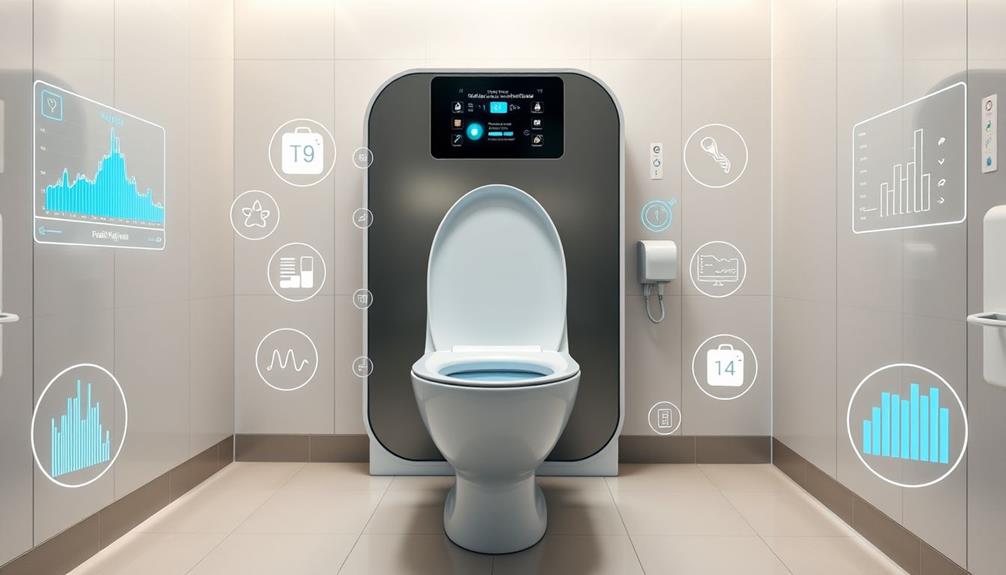
How can smart toilets revolutionize public health? These innovative devices can facilitate early disease detection by analyzing wastewater for health markers. Imagine a network of smart toilets shifting the focus from collective data to personalized health monitoring within communities. This change could enable real-time health monitoring and alert you to any emerging health issues.
| Benefits | Implications |
|---|---|
| Early Disease Detection | Reduces healthcare costs |
| Personalized Health Monitoring | Enhances community health |
| Chronic Disease Management | Supports proactive health measures |
The continuous data collection from smart toilets provides valuable insights into population health trends. This information can aid in identifying emerging health issues and improve chronic disease management on a larger scale. By integrating smart toilets into public health systems, we can greatly enhance our ability to respond to health crises. You'll find that this technology not only benefits individual health but also fosters a healthier community overall. As smart toilets become more widespread, they can play an essential role in shaping public health strategies and improving overall well-being.
Future Directions in Smart Toilets

With advancements on the horizon, smart toilets are poised to transform personal health monitoring in ways we haven't yet imagined. These innovations could redefine how you approach your health and wellness, offering real-time insights that enhance your daily life.
Here are some future directions for smart toilets:
- Advanced Molecular Analysis: Expect smart toilets to conduct thorough stool tests, detecting a broader spectrum of health issues, including gastrointestinal disorders.
- Integrated Digital Health: By connecting with digital health platforms, smart toilets can provide personalized health recommendations based on your unique data trends.
- User Differentiation Technology: Smart toilets may soon incorporate features that distinguish between multiple users, offering tailored insights for each family member.
- Public Health Surveillance: These toilets could play a significant role in monitoring health trends and outbreaks through individual waste analysis, providing essential data that surpasses traditional methods.
As sensor accuracy and data interpretation improve, smart toilets will shift towards preventive health care, allowing for early detection of potential health issues.
The future of health monitoring lies in these innovative devices, making personal and public health insights more accessible than ever.
Frequently Asked Questions
How Smart Toilets Can Monitor Health?
Smart toilets monitor your health by analyzing your urine and stool with advanced sensors. They track essential metrics, like hydration and gastrointestinal health, sending alerts when abnormal results are detected for timely medical attention.
Why Are Smart Toilets Important?
Smart toilets are essential because they provide you with real-time health insights effortlessly. By monitoring crucial metrics, you can proactively manage your well-being, detect potential issues early, and ultimately improve your overall health and quality of life.
What Is a Smart Toilet With Urine Analysis?
A smart toilet with urine analysis uses advanced sensors to monitor various health indicators. It analyzes your urine for biomarkers, offering insights into your health, like detecting infections or metabolic changes without any invasive procedures.
Is There a Smart Toilet That Identifies Analprints?
Yes, there are smart toilets that identify anal prints. This technology uses unique patterns for user identification, enhancing privacy and ensuring personalized health monitoring without exposing sensitive information to others. You'll enjoy tailored insights.
Conclusion
In a world where every flush could be a lifeline, smart toilets are stepping up as silent guardians of your health. They transform an ordinary bathroom into a personal health hub, catching subtle signs of trouble before they snowball. As technology swirls around us, embracing these innovations can empower you to take charge of your well-being. So, next time you sit down, remember: you might just be sitting on the future of health monitoring!
